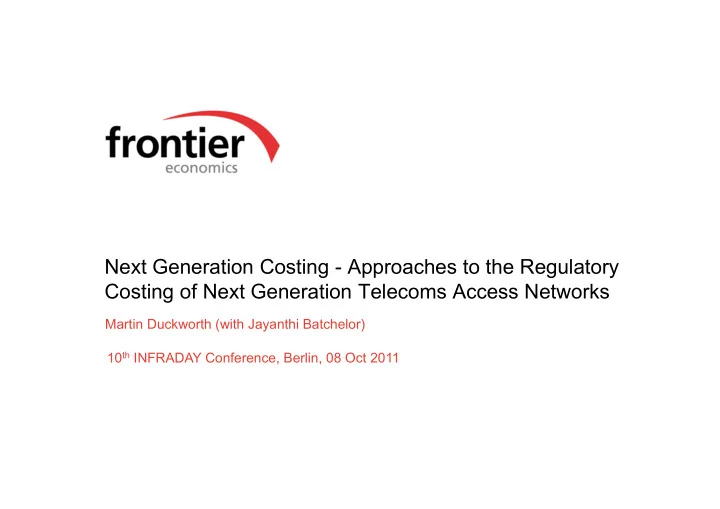

Next Generation Costing - Approaches to the Regulatory Costing of Next Generation Telecoms Access Networks Martin Duckworth (with Jayanthi Batchelor) 10 th INFRADAY Conference, Berlin, 08 Oct 2011
This presentation ● How should regulators cost the assets underlying telecommunications access networks during the roll out of fibre networks?
Agenda Next Current Context generation costing costing • How networks • How networks • Approaches and regulation have been to reflect are evolving costed to date changing objectives
● Context ● Current costing ● Next generation costing
Market developments drive regulation 1980s 1990s 2000s 2010s • Competition in • Vertically • Alternative • Alternative long distance integrated broadband broadband networks operators (e.g. suppliers suppliers mobile) • Competitors • Competitors • Duct access or require access • Competitors require access fibre access? to local require to copper telephone interconnection access network network … now at a crucial point in regulation
Current access regulation allows a range of access methods Resale of incumbent broadband service Bitstream service Local loop unbundling Sub loop unbundling Access to ducts … “ladder of investment” has delivered benefits
Move to fibre changes the available options Resale of incumbent broadband service Bitstream service Local loop unbundling Sub loop unbundling Access to ducts … raise challenges for competitors’ business models
Fibre roll out also challenging for regulators Large risky • Need to set the correct incentives for efficient investment investments Potential • Governments believe better broadband can bring wider economic benefits externalities Benefits of • Competition in broadband to date has brought clear customer benefits competition Co-existence • Regulated copper prices interact with fibre profitability with copper … need to review approach
Globally a range of options have been adopted Regulated access Forbearance Regulated access with public subsidy • Not regulating • Government • Apply existing access to fibre shares financial access regime, networks burden of roll out adapted to take but requires account of risk • Applied in the access US to new fibre • EU approach deployments • Applied in Singapore … reflecting competing objectives
● Context ● Current costing ● Next generation costing
Costing aims to set efficient access prices Allocative • Ensure maximum take up of services efficiency Dynamic • Ensure ongoing investment and innovation efficiency Productive • Minimise costs of delivering services across the industry efficiency … critical in contestable markets
Standard telecommunications costing approach developed in 1990s CCA LRIC Asset valuation + EPMU based on current Prices set costs to send according to Include mark up for correct build or buy incremental cost of fixed and common decisions to services costs to allow full competitors cost recovery • Allocative efficiency • Productive efficiency • Dynamic efficiency … assumes market is largely contestable
However CCA valuation of assets introduces uncertainty Benefits Disadvantages Introduction of CCA Incumbent prices can lead to holding reflect entrant costs gains or losses Enhances CCA valuations can productive efficiency introduce for replicable assets subjectivity … need to consider whether still appropriate
● Context ● Current costing ● Next generation costing
Objectives when reassessing asset valuation Encourage network • Stable regulatory environment roll out • Reward investors for risk Encourage service • Ensure affordability take up • Promote downstream competition Promote • Correct build or buy decisions for replicable assets competition • Ensure no margin squeeze Promote productive • Provide incentives for incumbents to minimise costs efficiency Practicality • Predictable, objective and harmonised approach … emphasis may vary
Costing approach should reflect nature of assets Increasing asset lives Active equipment Mix of technologies Copper Fibre cable New build Sunk legacy Duct Increasingly replicable Fixed and common cost … based on a range of factors including ‘replicability’
Helpful to look at approaches used in other regulated industries Economic HCA CCA depreciation Infrastructure Regulatory renewals asset value accounting
Duct valuation Potential Regulatory approach Nature of asset objectives Continuous Providing Renewals network investor accounting certainty on based Undefined future approach asset life investments Difficult to estimate replacement cost … requires determination of initial valuation
Copper cable Potential Regulatory approach Nature of asset objective Number of Ensuring Regulatory discrete appropriate asset value components use of sunk reflecting asset HCA Not the valuation modern Promoting an equivalent efficient asset transition to fibre … complex inter-relationship with fibre
Fibre Potential Regulatory approach Nature of asset objective Number of Providing Rolling discrete certainty for forwards components investors valuation based on Uncertainty Ensuring economic over future affordable depreciation usage prices for fibre product Unclear whether fibre is replicable … balance low prices with investment incentives
Active equipment (electronics) Potential Regulatory approach Nature of asset objective Number of Promoting Current Cost discrete efficient Accounting components competition Short asset lives Rapid technological evolution Assets are replicable … established regulatory approach is reasonable
Conclusion ● Telecommunications costing may move from ‘one size fits all’ to a more varied approach □ Subject to the Commission's current consultation
Frontier Economics Limited in Europe is a member of the Frontier Economics network, which consists of separate companies based in Europe (Brussels, Cologne, London and Madrid) and Australia (Melbourne & Sydney). The companies are independently owned, and legal commitments entered into by any one company do not impose any obligations on other companies in the network. All views expressed in this document are the views of Frontier Economics Limited.
FRONTIER ECONOMICS EUROPE LTD. BRUSSELS | COLOGNE | LONDON | MADRID Frontier Economics Ltd, 71 High Holborn, London, WC1V 6DA Tel. +44 (0)20 7031 7000 Fax. +44 (0)20 7031 7001 www.frontier-economics.com
Recommend
More recommend